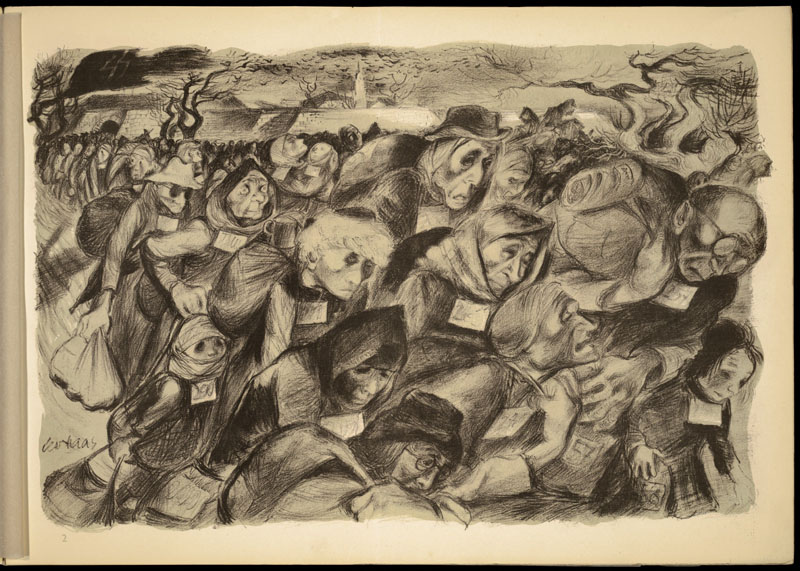Abraham Riemer. Rebecca Cohen. Jakob Zoller
Just three of names appearing on a list of dormant Swiss bank accounts, probable victims of Nazi persecution. Since the original Swiss claims process was established in 1997, restitution of the assets of Holocaust victims has resulted in a great deal of coverage and controversy. Many lawsuits seeking restitution have resulted in settlements or agreements, each with its own rules and claims procedures. Although most deadlines have expired, there are a number of restitution funds which are still open.
In two very recent developments, the Trump administration has signed an act that requires the U.S. State Department to report what European countries are doing to compensate Holocaust survivors. And earlier this year, approximately 25,000 Algerian Jews were recognized as Holocaust survivors by the German government and are eligible for a one-time payment. I will provide details and other active claims in an upcoming column.
READ: VIRTUAL MUSEUM ON JEWISH-CANADIAN HOLOCAUST REFUGEES OPENS
Please note that there are different claims procedures depending on the type of restitution you are claiming (such as for victims of slave labour, for people trying to retrieve deposited assets, for people who are heirs to claim old Swiss insurance policies, etc.) Each type of claim requires completion of a detailed form. Volunteer organizations from some local Jewish Federation and social service agencies worldwide are available to assist claimants with all the paperwork. You may also want to get professional assistance to sort your way through the claim maze – and to ensure that you do not invest much time, effort and hopes in a claim which has little chance of success. (Please note that I am not one of those professionals and do not have further information beyond what I am presenting here.)
One early and interesting article to summarize the struggle for Jewish reparations is also one of the most controversial. In 2001, Gabriel Schoenfeld, at the time senior editor of Commentary, took a look at the history of reparations and the early debates. (For example, in the 1950’s Menachem Begin, leader of Israel’s Herut Party, held street demonstrations to denounce the Israeli government for accepting German “blood money.”) Schoenfeld suggested that in addition to “stoking the fires of anti-Semitism on the right,” at least some of the claims had been settled under duress by banks or corporations anxious to avoid unceasing notoriety.
Schoenfeld’s article drew a great deal of response including a letter from then U.S. Deputy Secretary of the Treasury Stuart Eizenstat, a supporter of compensation for survivors of the Holocaust and their families. Eizenstat was organizer of 1988 Washington Conference – Principles on Nazi-Confiscated Art.
Just how many Holocaust survivors are alive today? Just after Elie Wiesel passed away in the summer of 2016, there were an estimated 100,000 Jews who were in camps, ghettos and in hiding under Nazi occupation. That was down from about a half million in 2014.
Writing in TheHIll.com, Gideon Taylor, chair of operations for the World Jewish Restitution Organization, explains why the fight for restitution is critical – even at this late date.
“Of course, the restitution of property cannot provide full justice for Holocaust survivors — nothing can. Yet restitution serves as a powerful recognition of the deprivation of property rights and a testament to countries’ efforts to acknowledge history. At a time when too many Holocaust survivors live with inadequate social care, restitution can provide the means for survivors to live with the dignity that they deserve.”
In Latvia, writes Taylor, “hundreds of communal properties, including synagogues and schools that belonged to a once-thriving Jewish community, remain unreturned. In Croatia and Slovenia, non-citizens are excluded from legislation that provided restitution for confiscated property. Bosnia has yet to address the issue.” And then there is Poland, “the sole European Union member without a national program to return or provide compensation for private property stolen during the war and its aftermath.”
The fight for restitution has been a difficult and often combative one but I would like to conclude with the story of Christophe Meili. In 1977, Meili was a security guard at the Union Bank of Switzerland when he discovered bank employees shredding what appeared to be important Holocaust-era documents.
After he handed those documents over to Jewish leaders, Meili was fired by the banks and received death threats for his efforts. Meili and his family eventually fled to the United States and in order to offer him refuge, then president Bill Clinton signed special legislation granting them permanent residency in the U.S.
In order to thank him for his honesty and sacrifice, Meili and his family were presented with an $18,000-a-year scholarship at Chapman University in Orange, California. The award came from a group of 650 Holocaust survivors.
